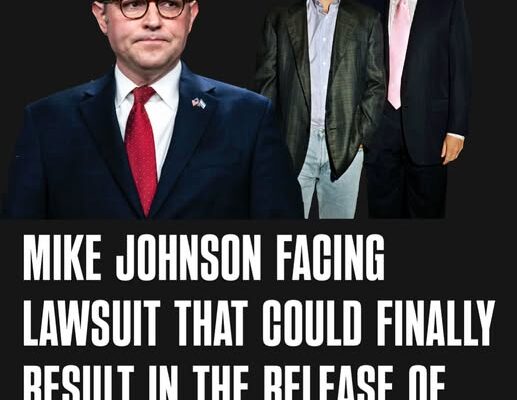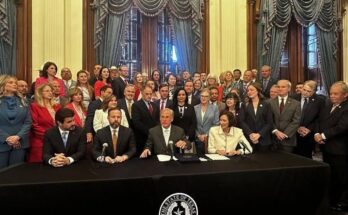Arizona sues Mike Johnson to force swearing-in of Democrat who could sway Epstein vote
Adelita Grijalva was elected last month but Republican House speaker has so far blocked her from taking seat
Arizona’s attorney general is suing to force the Republican House speaker, Mike Johnson, to swear in Adelita Grijalva, a Democrat who won a congressional special election in September.
Grijalva was elected on 23 September in the southern Arizona district that her father, Raúl Grijalva, held until his death earlier this year.
Kris Mayes, the Democratic attorney general in Arizona, had promised to sue if Johnson would not let Grijalva get started on her work. She sent a letter to Johnson on 14 October demanding he schedule a swearing-in within two days, which did not happen.
“By blocking Adelita Grijalva from taking her rightful oath of office, [Johnson] is subjecting Arizona’s seventh congressional district to taxation without representation. I will not allow Arizonans to be silenced or treated as second-class citizens in their own democracy,” Mayes said in a press release announcing the lawsuit.
Johnson has said he would seat Grijalva once the government reopens, but with Democrats and Republicans deadlocked, there is no sign that the shutdown – now the second-longest in US history – will end any time soon.
Grijalva, who has held local offices in Arizona for decades, went to Washington in early October, expecting to be sworn in and start her new job. Johnson has so far refused to schedule a swearing-in for her, depriving her of the ability to use her office or access parts of the Capitol designated for members of Congress without an escort.
“I want to get to work and I can’t,” Grijalva said in early October.
In a video on 16 October, Grijalva walks through her office at the Capitol and shows all the tasks she cannot do because she is not sworn in: she cannot print because she does not have a government email; she cannot access government-owned computers without an access code; and she does not have a budget to send flags to constituents.
“Yes, I have access to an office,” she said. “But it’s kind of like someone saying: here’s a car, and it doesn’t have an engine, gas or tires.”
Grijalva has said she believes Johnson is holding off on swearing her in because she wants to release the Epstein files. Although her presence would not give Democrats a majority in the House, it could tip the scales for a vote on the files. A legislative manoeuvre known as a discharge petition needs 218 signatures; it has 217 currently, and Grijalva said she would sign it.
Grijalva said in a statement: “It’s an unlawful breach of our constitution and the democratic process … Johnson cannot continue to disenfranchise an entire district and suppress their representation to shield this administration from accountability and block justice for the Epstein survivors.”
Grijalva has called on her supporters to sign a petition to demand she be sworn in. “The voters in southern Arizona elected Adelita Grijalva to Congress – but Republicans are delaying her swearing-in, blocking her from becoming the decisive 218th signature to force a vote on releasing the Epstein files,” the petition says.
Arizona’s senators, Democrats Ruben Gallego and Mark Kelly, have tried to press Johnson on the swearing-in, confronting him earlier this month and asking why he would not seat her. Johnson blamed the government shutdown and called the idea that the Epstein files played a role “totally absurd”. He called the two senators “experts in red herrings and distraction”.
In a TV interview last week, Johnson called the Grijalva issue a “farce” and blamed Democrats for shutting down the government. He said she still could do her job and access her office despite the lack of official ceremony.
At this unsettling time
We hope you appreciated this article. Before you close this tab, we want to ask if you could support the Guardian at this crucial time for journalism in the US.
Not all journalism is the same. At the Guardian, we see it as our job not only to report the facts as we find them, but to give you the whole picture. Never sanitized or censored, our reporting provides the historical and global context necessary to fully understand the turbulent times in which we’re living.
As we witness the erosion of democratic norms and political stability in our country – with heightened violence and division, troops on city streets, attacks on academia and science, and disregard for the rule of law – the role of the press as an engine of scrutiny, truth and accountability becomes increasingly important.
At the Guardian, we proudly platform voices of dissent, and we are fearless when it comes to investigating corruption and challenging power. We don’t have a single viewpoint, but we do have a shared set of values: humanity, curiosity and honesty guide us, and our work is rooted in solidarity with ordinary people and hope for our shared future.
Not every news organization sees its mission this way – and nor is their editorial independence as ironclad as ours. In the past year, several large US media outlets have caved to outside pressure at the behest of their corporate and billionaire owners. We are thankful the Guardian is different.
Our only financial obligation is to fund independent journalism in perpetuity: we have no ultrarich owner, no shareholders, no corporate bosses with the power to overrule or influence our editorial decisions. Reader support is what guarantees our survival and safeguards our independence – and every cent we receive is reinvested in our work.
It has never been more urgent, or more perilous, to pursue reporting in the US that holds power to account and counters the spread of misinformation – and at the Guardian we are proud to make trustworthy journalism free and accessible to all.
If you are able, please support our work today (we promise it’s very quick to do). Gifts of any and all sizes make a difference and are gratefully received, but a small monthly contribution that will help sustain us through this period is most helpful to us. Thank you for helping protect the free press.



